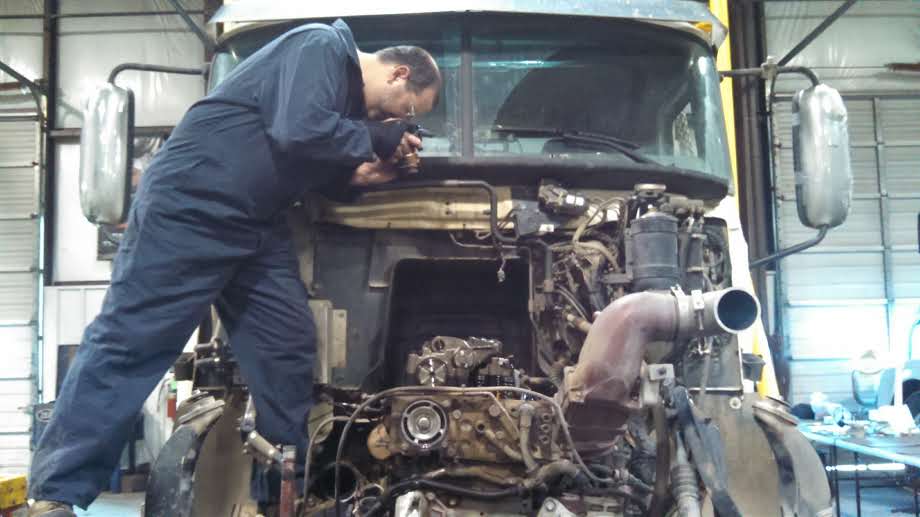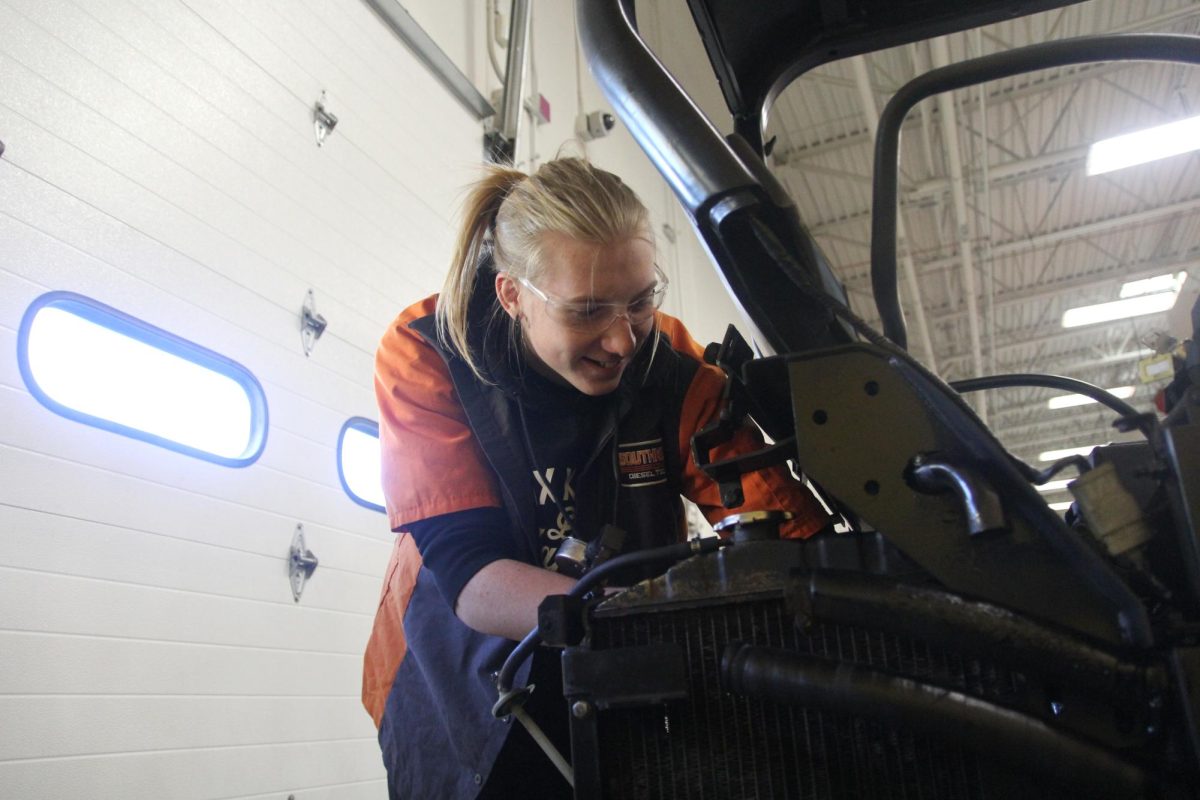From experimenting with motor oil to working on navy submarines, the new automotive instructor, Bertrand Potts has a long history of schooling and career work in his field.
“I have been in the automotive industry for 30 years,” Potts said “I really love this industry because it has so many different options and denominations that you can choose from. Automotive is a really good skill to learn because it gives you a job to always fall back on.”
Starting his career in marine sciences and oceanography, Potts quickly realized his passion for servicing and repairing engines when attending trade school.
“I initially went to CTE which we used to call vocational school. They had marine sciences and oceanography there,” Potts said. “I started on that career path and realized that it wasn’t for me. So I switched over to marine trades. I worked on an old 72-foot navy sub-chaser with eight engines in it. I also took many naval science classes, learning the history of the navy and our country.”
After his vocational schooling, Potts decided to pursue his interest in engine repair and begin his life-long application to the automotive trade.
“I attended the Engine City Technical Institute, which is similar to Lincoln Tech. It was a one-year diesel, drivetrain, and brakes course. Upon graduation from there, I was asked to work with ExxonMobil. They had a research and development camp in Lington, New Jersey where I started in their engine laboratory, mainly experimenting with oil formulations.
It’s not just about swinging a wrench, there are so many different things involved in this industry and you can do so much with the information from this course.
After spending three years testing and formulating motor oils, Potts took a job experimenting with new chemical dispersant technologies.
“I was apart of the ultra-low vacuum distillation unit. We would mix all of these nasty chemicals together to create a backbone polymer and dispersant,” Potts said. “But all of those nasty chemicals had to come out, so you would distill them. The distillation was a whole long chemical process and understanding the mechanics of all this was bewildering to me because I had been working with them for a while, but I worked on engines. This was more scientific and definitely a huge learning curve for me.”
Twelve years ago, Potts made the decision to move to Las Vegas in search of more unique job opportunities, and in 2008, he decided to take a new step in his career.
“When I moved to Vegas, I decided to create my own supply chain management company that serviced trucks for big transportation businesses like FedEx. It was a big change in owning a business, but was a really fun experience.”
The best part for me is that I can pass my knowledge to help students in the future.
Amidst the pandemic, Potts was looking for a new occupation and was thrilled when he was offered a unique and exciting new job to teach.
“I was super excited when I was offered a teaching position here at Southwest,” Potts said. “It was a passion of mine and something that I had always wanted to do. I have a lot of experience and I want to pass it on. It’s not just about swinging a wrench, there are so many different things involved in this industry and you can do so much with the information from this course.”
Potts was excited to work with students because it would be his first-ever certified teaching experience. With the class being online this year, Potts is disappointed that his students will not be able to work in the shop, but has planned other ways for students to gain real-world learning and experience.
“My good friend who is head of the API (American Petroleum Institute) has offered to give my students a virtual tour of their factory to show how oil is formulated and why it is made. I think this will be more engaging and fun than the usual online lessons.”
Potts believes that sharing his information and expertise will better the skills of his students and open up many opportunities for them.
“The best part for me is that I can pass my knowledge to help students in the future. As I like to say, knowledge is power, and it’s portable. You can take it wherever you go.”





![Weighing her options, senior Allyana Abao decides between going on a practice drive or calling an Uber. Though unlicensed, Abao has considered driving to be a significant milestone of teen independence despite alternatives that provide much easier solutions.
“You're able to be independent and not rely on others,” Abao said. “You're able to get a job, get things that you need, go places you need to go. I have so many places that I want to go to and I ask [my family] for so much. I want to be independent to where they know that I can do things on my own, so they know that they don't have to be there for me.”](https://southwestshadow.com/wp-content/uploads/2025/10/IMG_2922-1200x900.jpg)
![Looking at the board, former BSU secretary Christina Altaye begins to prepare for BSU’s second year of Club Feud. This year, “Are You Smarter Than a Ninth Grader?” will be replacing this event. “I think it’s a fun change [to Club Feud],” BSU Activities Director Hellen Beyene said. “[I think] it’s always fun to do something new and different.”](https://southwestshadow.com/wp-content/uploads/2025/10/Screenshot-2025-09-29-11.06.43.png)

![Grabbing her phone to take a photo, sophomore Vanessa Ta sits down on a bed and takes a couple photos to post on her social media. “I just really [feel] that my favorite cosplayer is everyone lowkey, because I get to see people’s creativity,” Ta said. “I get to see how skilled and talented they are.”](https://southwestshadow.com/wp-content/uploads/2025/10/55A1FC60-BE63-4F24-9B78-65194336319E-e1760926431267.jpg)
![In his fifth period World History class, Thur works with his students individually, helping them as they sort through notes and assorted historical documents. “I’m always willing to try something new,” Thur said. “Some of my best ideas that I’ve received over the years are from students. This year I’m trying out stations for the first time and kids are rotating through and it’s working. Well, some things are [working], I’ve still got to work out the kinks with it. The kids change, why shouldn’t I change too?”](https://southwestshadow.com/wp-content/uploads/2025/10/IMG_8991-1200x800.jpg)
![Fast food has not stayed the same principle of “sit down, order, and get food,” but has turned into a process with multiple layers and complexity. This is largely due to the integration of automation in every aspect of dining. “I'm not that knowledgeable on it, but I've seen videos on TikTok, I'm not really concerned—it doesn’t seem that smart,” senior Dallas Evertt said. “When [some people are just ordering] 18,000 water cups, it sounds really dumb. There was no way [the AI] was gonna put down 18,000 water cups—and that just shows how it’s not going to take anybody’s job soon.”](https://southwestshadow.com/wp-content/uploads/2025/10/Dominante-Image-1200x675.png)
![Squaring up to a practice dummy, sophomore Cypher Andres prepares to throw a punch. Dummies are regularly used to help him prepare certain hits to take his opponents down. “[Boxing dummies help me practice] because it’s basically a model of the body,” Andres said. “It helps with accuracy, such as pressure points behind the ear, and a clean liver shot can end the fight.”](https://southwestshadow.com/wp-content/uploads/2025/10/IMG_5728-e1759850486200-1200x864.jpg)
![Swaying and preparing to toss the tennis ball, Dylan Grove practices serving. Grove had been training in preparation for her upcoming matches against Chaparral and Doral Red Rock. “[Both teams are] both very tough opponents, but I am ready for whatever gets thrown my way,” Grove said.](https://southwestshadow.com/wp-content/uploads/2025/10/image-1200x900.png)





